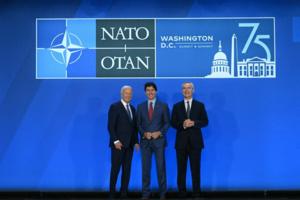From the Right
/Politics

Donald Trump is the most effective performance artist of all time
PARIS — U.S. President-elect Donald Trump should seriously consider taking his act to this year’s Art Basel or Venice Biennale.
The former and near-future Oval Office occupant has mused about buying Greenland, making Canada the 51st state, reclaiming the Panama Canal and renaming the Gulf of Mexico as the Gulf of America. All these things ...Read more

Why does Musk get lambasted while Soros gets decorated?
PARIS – One minute, he’s telling “subtard” online critics of his policy ideas to go “f**k yourself in the face.” The next, he’s fanboying for populist leaders at home and abroad. So what’s the problem with Elon Musk? Aside from his politics, that is.
If Musk, the richest man in the world, held political views that were more ...Read more

Americans’ biggest fear heading into 2025 speaks volumes
PARIS — The issue that most kept Americans awake at night over the past year wasn’t health or work issues, or even relationship troubles. It was the corrupt establishment.
A whopping 65 percent of Americans say that they’re more worried about “corrupt government officials” than even loved ones getting seriously sick or dying or not ...Read more

The Top Issue That Defined 2024 (and Embarrassed the Globalists)
PARIS — It’s amazing how fast the woke Western establishment turned into a bunch of bigots, by their own definition, when they sensed that their own backsides were on the line this year.
It seems like just yesterday that leaders across Western Europe and North America were advertising their openness to immigration from around the world as ...Read more

Farmers just won a presidential election victory — and promptly had it stolen from them
PARIS — Farmers are redrawing Europe’s political map with one electoral victory after another – and the establishment is in full panic mode. What the heck did they expect?
If current mainstream narratives are to be believed, a Romanian “far-right” politician, Călin Georgescu, who once committed the thought crime of referring to ...Read more

The French view of Trump’s Parisian three-way with Macron
PARIS — Donald Trump gets invited by the desperate Frenchman running the country to celebrate the newly-renovated Notre Dame cathedral — and ends up walking straight into a ménage-à-trois with a guy dressed like he got lost while trimming the shrubs.
During Trump’s first term, French President Emmanuel Macron fancied himself a “Trump ...Read more

Is Ukraine seriously hanging out with Al-Qaeda in Syria?
VANCOUVER, British Columbia – Excuse me, but what the heck would Ukrainian special forces be doing in Syria? Oh, nothing – just hanging out with the ideological descendants of the guys who brought down New York’s Twin Towers on Sept. 11, 2001, according to Ukraine’s own English language newspaper, the Kyiv Post.
Remember Al-Qaeda? Here�...Read more

Please, Trump, kick Canada out of NATO
VANCOUVER, British Columbia — Incoming US President-elect Donald Trump keeps threatening to dropkick countries like Canada that don’t meet their defense spending obligations as members of the transatlantic weapons lobby known as the North Atlantic Treaty Organization (NATO) out of its protection racket. Please, just do Canadians the honor, ...Read more

Trump’s Shock and Awe Cabinet Picks Are Everything that America Needs
VANCOUVER, British Columbia – Many of US President-elect Donald Trump’s cabinet nominees just don’t have the gravitas or institutional experience in dealing with giant bureaucracies to serve effectively, critics say. That whining you hear is the sound of progress.
Trump, who has spent his entire business career in real estate, taking a ...Read more

Lessons from a Trumpquake
VANCOUVER, British Columbia – In the end, it wasn’t even close. How did an impeached former president and convicted felon end up back in the White House by an overwhelming margin of 312 to 226 electoral votes, and with carte blanche Republican control of the Senate and likely also Congress? Buckle up for a leisurely cruise through ...Read more

Kamala Harris’ calls for ‘unity’ probably aren’t what you think
VANCOUVER, British Columbia — What could be nicer music to the ears of a deeply divided American electorate than U.S. Vice President Kamala Harris’ calls for “unity” as her final campaign message? Well, put it this way: You know when you went to the amusement park and were lured by the gentle-looking kiddie ride, only to have it spin you...Read more

Why American Allies Are Terrified of a Trump Re-election
VANCOUVER, British Columbia – The Western establishment is desperate for a Trump loss on Nov. 5 – to the point of tacitly supporting pro-Harris foreign election meddling.
“I have nearly 100 Labour Party staff (current and former) going to the US in the next few weeks heading to North Carolina, Nevada, Pennsylvania and Virginia,” wrote ...Read more

Kamala Harris is Championing a Catastrophic Canadian Policy
VANCOUVER, British Columbia – The carbon tax scam here in Canada is an abysmal failure, to the point where it’s increasingly looking like Prime Minister Justin Trudeau is going to have to scrap it if he wants any hope of getting re-elected. Apparently, US Democratic presidential contender, Vice President Kamala Harris, didn’t get the memo....Read more




































